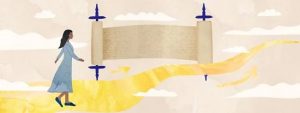
Art by Sefira Lightstone
A WEEKLY TORAH THOUGHT FROM RABBI MORDY
This week’s Parsha begins the difficulties of the Jewish People. Until now, they were not yet a nation and more of a tribe; their difficulties were not so much an oppression but challenges that had to be overcome. Yet here we are. And as difficult as the slavery was in Egypt, there was an event that changed the course of Jewish history. Moses was born despite the law of genocide against Jewish males being born in Egypt. Not only that, he is tapped by G-d to lead the Jewish people out of Egypt. A couple points to ponder here. First, while the Parsha is difficult, we find that bright spot. Sure, we can look at the portion and say, “this is a rough one” but even in the darkest moments of history, it is our task, our duty, to seek out the light. (The news from Israel is heartbreaking but the caring among Jews is unprecedented!) Second, once Moses is tapped by G-d at the Burning Bush, he immediately brings his brother Aaron to assist him in his leadership. A good leader doesn’t just take the job entrusted to him, but seeks out others who can assist him in his mission. And so the redemption from this horrific slavery begins. But one more episode takes place that cements Moses’s role in Jewish history. Moses beseeches of Pharaoh that he let the Jewish People out of Egypt. How does Pharaoh respond? By increasing the labor they were tasked to accomplish. He not only doesn’t reward the request, he makes it all the more difficult for the Jewish People. So Pharaoh is clearly a tyrant and one can imagine that the Jewish People were pretty upset by this, but what happens once they approach Moses? Moses goes right back to G-d and complains on behalf of the Jews. What is the lesson for us? Moses easily could’ve been starstruck; after all, G-d spoke to him! He could’ve easily hid behind the veil of holiness and spirituality to tell the Jewish People that they must continue since G-d has promised that they would be set free, and yet he goes one step further. He goes back to G-d, as he did several times throughout his leadership, to beseech G-d to make it easier on them. G-d once again promises that they will get out, and soon, and Moses is calmed. But we must take to heart this message. When we see something that appears unjust, regardless of how we know it works in the greater good, that awareness does not free us from complaining, from acting, from beseeching G-d that we find out the real reason for this distress. At a moment such as this, when there have been difficulties all around us, and an overall cause for concern, let us pray, let us complain, let us cry out until we see the good behind the hardships that befall us. Yes, there are plenty of bright spots and we should focus on them, but let us not lose sight of the difficulties and complain until we see the ultimate light that G-d has promised the Jewish people and the whole world—may it be soon! Good Shabbos!

